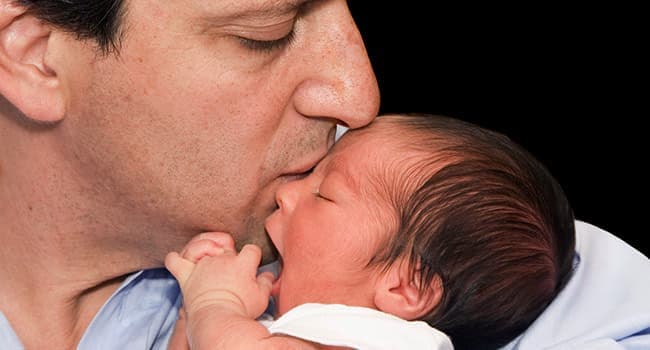
Over the last 4 decades, the number of men older than 40 who father a child has more than doubled. But only recently have researchers begun to explore what impact a dad's age may have on his unborn children.
A study published in the journal BMJ in October 2018 found that children of men ages 45 to 54 have a 14% higher risk of premature birth and low birth weight, compared with those fathered by men ages 25 to 34. Early births make children more vulnerable to long-term physical and mental health problems, while low birth weight may require a stay in the hospital's newborn intensive care unit. Previous research has suggested that a dad's older age boosts the risk of miscarriage as well as his child's chances of having autism and schizophrenia.
What explains the link between a man's age and the health of his children? Michael Eisenberg, MD, the BMJ study's lead author and an associate professor of urology at the Stanford University School of Medicine, offers two possibilities: DNA mutations that accumulate as men age, and harms that may result from obesity, poor diet, lack of exercise, and other things. "Those could potentially put a pregnancy at risk," says Eisenberg, "but we don't know for certain at this point."
Eisenberg doesn't want his research to scare men over 40 away from having children. He points out that although the risk of complications does appear to rise with age, the overall risk of birth problems remains low. Still, age and health do influence your chances of conceiving a child in the first place. It often takes older men longer to impregnate a woman, for example, while obesity and physical inactivity appear to degrade semen quality, he says.
While you can't stop time, you can -- and should -- take good care of yourself. Your health will benefit, and so may the health of your future children. "I talk to fathers-to-be about exercising as well as maintaining a good diet and a healthy body weight," Eisenberg says. "Anything that affects your heart will affect your fertility."
Most attention has been focused on the risks associated with a mom's age and health, but Eisenberg emphasizes that men need to better understand their own role in reproduction. "Keep in mind that fertility is a team sport," he says.
Ask Your Doctor
If you’re an older man who’s thinking about becoming a dad, you could ask your doctor:
- Do I have health risks that could affect a child I want to father? In addition to age, your weight, diet, and exercise level may contribute to your child's health, so get a thorough checkup that will identify any concerns.
- How can I improve my ability to father children? Be upfront about smoking, alcohol, and illicit drugs, which can harm your fertility. Also, have your doctor review your medications. Some drugs affect fertility.
- Should I have a semen analysis? It's worth considering, to make sure everything's normal. For example, if you learn that you have a low sperm count, you could consider fertility assistance sooner than you otherwise might.
- Am I too old? While certain risks may rise with age, men continue to produce sperm throughout their lives and can father healthy children into old age.
Find more articles, browse back issues, and read the current issue of WebMD Magazine.


